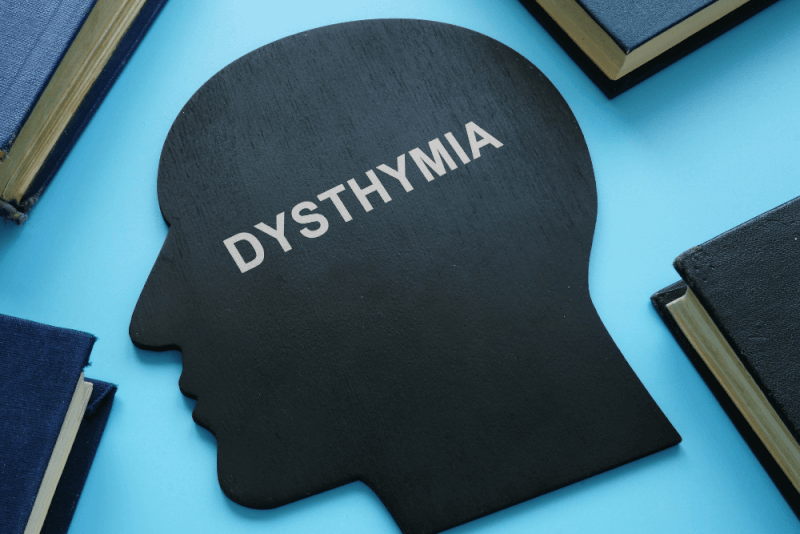What is Dysthymia (chronic depression)?
Dysthymia, also known as persistent depressive disorder, is a long-term and continuous form of depression. People may feel sad and empty, lose interest in daily activities, and struggle to complete everyday tasks. Additionally, individuals with low self-esteem may feel like failures. These feelings can last for years, significantly impacting their relationships, daily activities, work, or school.
People with dysthymia have difficulty being optimistic even during happy moments. They tend to be pessimistic and constantly complain. While persistent depressive disorder is not as severe as major depression, the mood disturbance can be mild, moderate, or severe.
Since dysthymia is long-lasting, coping with symptoms of depression can be challenging. Therefore, treatment often includes a combination of medication and therapies such as talk therapy.
Dysthymia (chronic depression) diagnosis
If dysthymia is suspected in a person, the following examinations and tests may be conducted.
Physical examination
Experts may conduct a physical examination and ask in-depth questions about the patient's health to determine the cause of the depression. This helps to identify whether the feelings are due to underlying physical health issues.
Laboratory tests
Since depression is not solely caused by psychological reasons, laboratory tests that eliminate physical causes can be applied. For example, in cases where enough thyroid hormone is not produced, depression symptoms can occur. Various laboratory tests are used to rule out such physical issues.
Psychological evaluation
If no physical problem is found, a psychological evaluation is conducted. This evaluation involves talking about thoughts, feelings, and behaviors and filling out various questionnaires. This assessment helps diagnose not only persistent depressive disorder but also other psychological conditions that may affect mood, such as major depression, seasonal affective disorders, or bipolar disorder.
The diagnosis of dysthymia in children is different from that in adults. For adults, a depressive mood must appear for most of the day for at least 2 years, while for children, it is sufficient for the depressive mood to appear for most of the day for at least 1 year. Persistent depressive disorder can cause different symptoms in individuals. If dysthymia begins before the age of 21, it is called early onset. If it starts at age 21 or older, it is called late onset.
Symptoms of Dysthymia (chronic depression)
The symptoms caused by dysthymia usually come and go over the years. The intensity of symptoms can vary over time, but they typically last for at least 2 months during each episode. Major depressive episodes can also occur before or during persistent depressive disorder. Symptoms of dysthymia can cause significant problems in daily life. These symptoms include:
- Sadness, emptiness, or low mood
- Hopelessness
- Loss of interest in daily activities
- Sleep problems
- Fatigue and lack of energy
- Poor appetite or overeating
- Low self-esteem, self-criticism, or feeling unworthy
- Feelings of guilt and worries about the past
- Difficulty concentrating and making decisions
- Avoiding social activities
- Trouble getting things done well and on time
- Irritability, impatience, or anger
- In children, depressive mood and irritability are seen.
Causes of Dysthymia (chronic depression)
The exact cause of dysthymia is unknown. Similar to major depression, chronic depression can have multiple causes. These causes include:
Biological differences
People with persistent depressive disorder may have physical changes in their brains. While the significance of these changes is unclear, they may help determine the causes of chronic depression.
Brain chemistry
Neurotransmitters are naturally occurring brain chemicals. Research on this topic shows that changes in neurotransmitters play a significant role in depression and its treatment.
Genetic traits
Chronic depression is more common in people with a family history of the condition. Therefore, researchers continue to study genes that may contribute to depression.
Life events
Traumatic events such as the loss of a loved one, financial problems, or high levels of stress can trigger chronic depression in some people, as seen in major depression.
Treatment methods for Dysthymia (chronic depression)
The two main treatments for chronic depression are medications and talk therapy. The recommendations of experts depend on the following factors:
- The severity of the symptoms
- The type of treatment preferred
- The desire to explore emotional or other problems affecting life
- Any other emotional problems present
- Previous treatment methods applied
- The ability to tolerate medications
When it comes to children and adolescents, talk therapy is often the first recommended treatment for persistent depressive disorder. However, this depends on the individual. In some cases, antidepressants may also be needed.
Medications
The most commonly used types of antidepressants for treating chronic depression include:
- Selective serotonin reuptake inhibitors
- Tricyclic antidepressants
- Serotonin and norepinephrine reuptake inhibitors
Finding the right medication for treatment may require trying several drugs or a combination of these drugs. At this point, individuals need to be patient. Some medications may take several weeks or longer to take effect.
People taking antidepressants should not stop taking them without consulting their doctors. When the time comes, doctors can help reduce the dose slowly and safely. Otherwise, abruptly stopping treatment or missing a few doses can cause withdrawal-like symptoms.
Additionally, suddenly stopping medication can cause depression to worsen rapidly. Long-term use of antidepressants may be necessary to keep symptoms under control in the case of persistent depressive disorder.
Talk therapy
Also known as psychotherapy, talk therapy is a general term for treating depression by talking with a mental health professional about thoughts, feelings, behaviors, relationships, and related issues. Different types of psychotherapy, such as cognitive-behavioral therapy, can be effective for persistent depressive disorder.
Clients and therapists can discuss goals for therapy and other aspects such as the duration of treatment. Talk therapy can help with the following:
- Adjusting to a crisis or other current difficulties
- Exploring relationships and experiences and developing positive interactions with others
- Identifying problems contributing to depression and changing behaviors that worsen symptoms
- Finding better ways to cope with and solve problems
- Identifying negative beliefs and behaviors and replacing them with healthy, positive behaviors
- Setting realistic goals for life
- Regaining a sense of satisfaction and control in life and helping alleviate symptoms of depression such as hopelessness and anger
Difference between Dysthymia and major depression
Although dysthymia and major depressive disorder overlap in some ways, there are significant differences between them. These differences include:
- Persistent depressive disorder has fewer symptoms.
- Dysthymia lasts longer.
- Major depressive disorder can be diagnosed if symptoms continue for 2 weeks.
Risk factors for Dysthymia (chronic depression)
Persistent depressive disorder typically starts in childhood, adolescence, or young adulthood and lasts a long time. Several factors, including the following, increase the risk of developing this condition:
- A family history of major depressive disorder or other depressive disorders
- Traumatic events such as the loss of a loved one or major financial problems
- Low self-esteem, being overly dependent, or self-critical
- Negative personality traits such as always expecting the worst
- Other mental health disorders such as personality disorders
Complications of Dysthymia (chronic depression)
Complications associated with persistent depressive disorder may include:
- Lower quality of life
- Personality disorders or other mental health disorders
- Major depression, anxiety disorders, and other mood disorders
- Suicidal thoughts or behaviors
- Substance abuse
- Chronic pain and general medical illnesses
- Relationship difficulties and family conflicts
- Difficulty managing school or work responsibilities
How to prevent Dysthymia (chronic depression)?
There is no sure way to prevent persistent depressive disorder. It often starts in childhood or adolescence, so it is essential to identify children at risk and ensure they receive early treatment. Strategies that may help reduce or prevent symptoms include:
- Managing stress
- Increasing problem-solving abilities
- Boosting self-esteem
- Reaching out to family and friends during tough times
- Getting early treatment to prevent worsening of symptoms
- Receiving long-term treatment to prevent symptom recurrence







